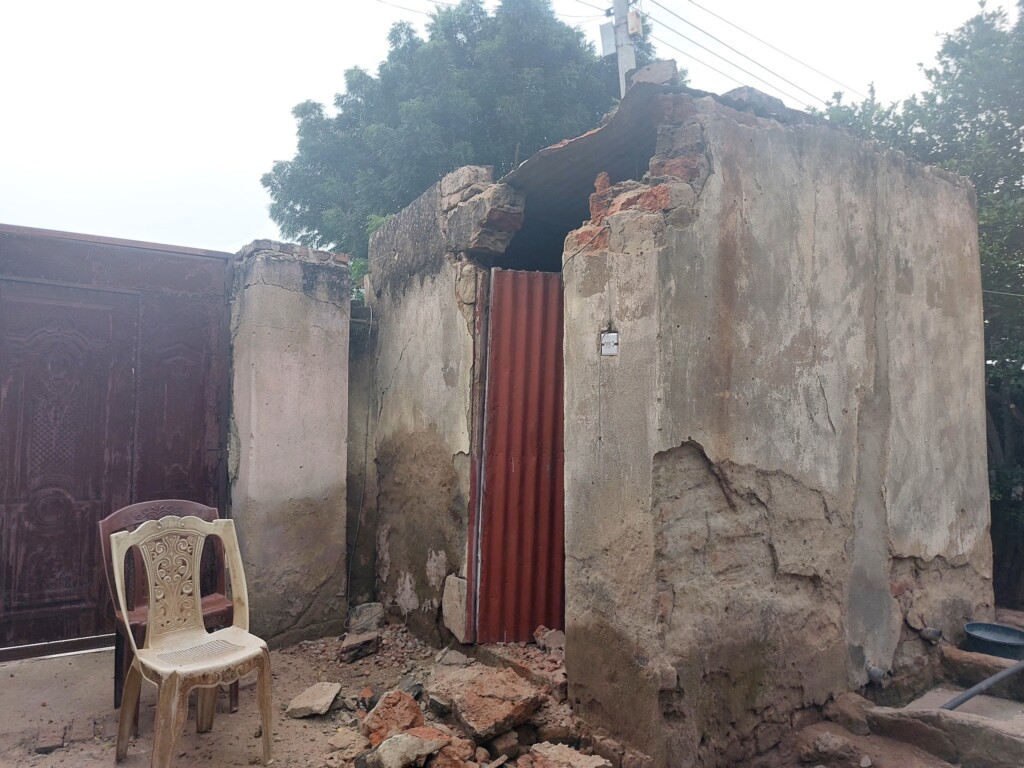Air strikes and cholera outbreak ravage Kordofan and Darfur

A house damaged by shelling in Kadugli, South Kordofan, 18 October 2025 (Photo: Supplied)
Reports indicate that the Sudanese Armed Forces carried out air and drone strikes on El Geneina, capital of West Darfur and Saraf Umra in North Darfur on Sunday, killing and injuring civilians.
Witnesses said a drone struck the Government Secretariat in El Geneina, setting off a blaze and destroying an ammunition depot.
Officials from the RSF-backed Sudan Founding Alliance (Tasees) condemned the raids, accusing the army of deliberately attacking civilians in markets and residential areas.
“These attacks are ordered by the leadership of the Islamic Movement,” the Tasees officials said, calling them “acts of genocide” against communities in Darfur and Kordofan.
It urged the international community and human rights organisations to intervene, warning that the bombings violate international law and the Geneva Conventions.
The Head of the Civil Administration in South Darfur, Youssef Idris Youssef, also denounced the strikes on civilian institutions, describing them as war crimes.
‘Kordofan airstrikes’
Heavy artillery and drone strikes hit Kadugli in South Kordofan and El Obeid in North Kordofan on Sunday.
Residents told Radio Dabanga that the bombardment in Kadugli, the capital of South Kordofan, targeted weapons depots belonging to armoured units, triggering massive explosions that shook the city.
Shells fell near the Academy of Health Sciences, sending terrified civilians running for cover. Several houses were damaged, though casualty figures remain unknown.
‘Cholera outbreak in mine’
The Anti-Cyanide Committee in South Kordofan’s Qadir locality reported last week a deadly cholera outbreak at the Tukoula gold mine in the Talodi area, where 23 people have died, and 145 others have fallen ill. Investigators suspect cholera, though officials caution that toxic mining waste could also be to blame.
Authorities in Talodi have sealed off the city after dozens of patients were moved from Takoula to Talodi Hospital, where most of the deaths occurred. Security forces have stopped lorries carrying mining waste from entering nearby towns.
Health workers confirmed 73 new infections and seven deaths, many linked to miners from Takoula. Local authorities have closed markets, tea stalls, and restaurants for three days and launched disinfection and awareness drives through mosques and door-to-door visits.
The Federal Ministry of Health last week reported 611 cholera cases in 15 states, with North and South Kordofan, South Darfur, and Central and East Darfur among the worst affected.
‘Health infrastructure collapse’
In Kadugli, health facilities are on the brink of collapse. A medical source told Radio Dabanga yesterday, that malaria, typhoid, and acute watery diarrhoea are spreading fast amid severe medicine shortages and soaring prices.
“Kadugli Hospital is overflowing,” he said. “It has no ventilation, no essential drugs. Only intravenous fluids are available, and they are running out.”
Basic treatment has become unaffordable. Samixon, a common antibiotic, now costs SDG15,000 per vial, while Quartem, used for malaria, has disappeared. A malaria test costs SDG10,000, a typhoid test SDG20,000.
“The cost of care is beyond reach for most families,” the doctor said. “This is a humanitarian catastrophe.”
‘South Darfur displacement grows’
In South Darfur, officials reported five new cholera cases and one death on Sunday, bringing totals since May to 5,805 infections and 275 deaths.
Community activist Abdallah Mohamed El Hassan told Radio Dabanga that the outbreak is now declining, thanks to vaccination drives and sanitation campaigns that have also reduced malaria cases.
He warned, however, that displacement is worsening. “Families keep arriving every day,” he said. “They urgently need humanitarian aid.”
Authorities are working with relief agencies to relocate people from small camps to larger centres for better assistance.








 and then
and then